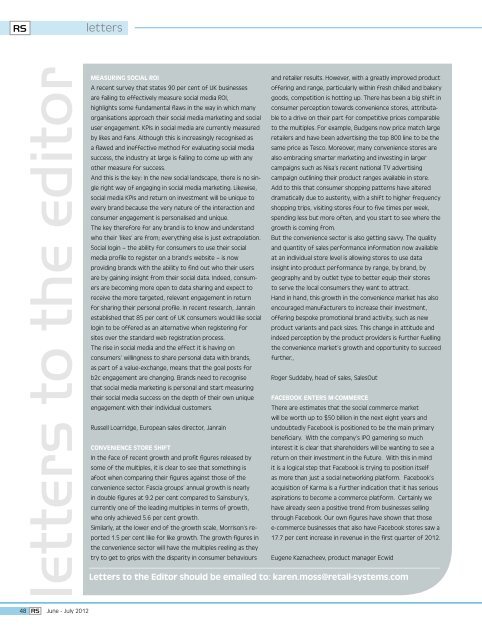payments - Retail Systems
payments - Retail Systems
payments - Retail Systems
You also want an ePaper? Increase the reach of your titles
YUMPU automatically turns print PDFs into web optimized ePapers that Google loves.
RS<br />
letters to the editor<br />
48 RS June - July 2012<br />
letters<br />
MEASURING SOCIAL ROI<br />
A recent survey that states 90 per cent of UK businesses<br />
are failing to effectively measure social media ROI,<br />
highlights some fundamental flaws in the way in which many<br />
organisations approach their social media marketing and social<br />
user engagement. KPIs in social media are currently measured<br />
by likes and fans. Although this is increasingly recognised as<br />
a flawed and ineffective method for evaluating social media<br />
success, the industry at large is failing to come up with any<br />
other measure for success.<br />
And this is the key: In the new social landscape, there is no single<br />
right way of engaging in social media marketing. Likewise,<br />
social media KPIs and return on investment will be unique to<br />
every brand because the very nature of the interaction and<br />
consumer engagement is personalised and unique.<br />
The key therefore for any brand is to know and understand<br />
who their ‘likes’ are from; everything else is just extrapolation.<br />
Social login – the ability for consumers to use their social<br />
media profile to register on a brand’s website – is now<br />
providing brands with the ability to find out who their users<br />
are by gaining insight from their social data. Indeed, consumers<br />
are becoming more open to data sharing and expect to<br />
receive the more targeted, relevant engagement in return<br />
for sharing their personal profile. In recent research, Janrain<br />
established that 85 per cent of UK consumers would like social<br />
login to be offered as an alternative when registering for<br />
sites over the standard web registration process.<br />
The rise in social media and the effect it is having on<br />
consumers’ willingness to share personal data with brands,<br />
as part of a value-exchange, means that the goal posts for<br />
b2c engagement are changing. Brands need to recognise<br />
that social media marketing is personal and start measuring<br />
their social media success on the depth of their own unique<br />
engagement with their individual customers.<br />
Russell Loarridge, European sales director, Janrain<br />
CONVENIENCE STORE SHIFT<br />
In the face of recent growth and profit figures released by<br />
some of the multiples, it is clear to see that something is<br />
afoot when comparing their figures against those of the<br />
convenience sector. Fascia groups’ annual growth is nearly<br />
in double figures at 9.2 per cent compared to Sainsbury’s,<br />
currently one of the leading multiples in terms of growth,<br />
who only achieved 5.6 per cent growth.<br />
Similarly, at the lower end of the growth scale, Morrison’s reported<br />
1.5 per cent like for like growth. The growth figures in<br />
the convenience sector will have the multiples reeling as they<br />
try to get to grips with the disparity in consumer behaviours<br />
and retailer results. However, with a greatly improved product<br />
offering and range, particularly within fresh chilled and bakery<br />
goods, competition is hotting up. There has been a big shift in<br />
consumer perception towards convenience stores, attributable<br />
to a drive on their part for competitive prices comparable<br />
to the multiples. For example, Budgens now price match large<br />
retailers and have been advertising the top 800 line to be the<br />
same price as Tesco. Moreover, many convenience stores are<br />
also embracing smarter marketing and investing in larger<br />
campaigns such as Nisa’s recent national TV advertising<br />
campaign outlining their product ranges available in store.<br />
Add to this that consumer shopping patterns have altered<br />
dramatically due to austerity, with a shift to higher frequency<br />
shopping trips, visiting stores four to five times per week,<br />
spending less but more often, and you start to see where the<br />
growth is coming from.<br />
But the convenience sector is also getting savvy. The quality<br />
and quantity of sales performance information now available<br />
at an individual store level is allowing stores to use data<br />
insight into product performance by range, by brand, by<br />
geography and by outlet type to better equip their stores<br />
to serve the local consumers they want to attract.<br />
Hand in hand, this growth in the convenience market has also<br />
encouraged manufacturers to increase their investment,<br />
offering bespoke promotional brand activity, such as new<br />
product variants and pack sizes. This change in attitude and<br />
indeed perception by the product providers is further fuelling<br />
the convenience market’s growth and opportunity to succeed<br />
further.,<br />
Roger Suddaby, head of sales, SalesOut<br />
FACEBOOK ENTERS M-COMMERCE<br />
There are estimates that the social commerce market<br />
will be worth up to $50 billion in the next eight years and<br />
undoubtedly Facebook is positioned to be the main primary<br />
beneficiary. With the company’s IPO garnering so much<br />
interest it is clear that shareholders will be wanting to see a<br />
return on their investment in the future. With this in mind<br />
it is a logical step that Facebook is trying to position itself<br />
as more than just a social networking platform. Facebook’s<br />
acquisition of Karma is a further indication that it has serious<br />
aspirations to become a commerce platform. Certainly we<br />
have already seen a positive trend from businesses selling<br />
through Facebook. Our own figures have shown that those<br />
e-commerce businesses that also have Facebook stores saw a<br />
17.7 per cent increase in revenue in the first quarter of 2012.<br />
Eugene Kaznacheev, product manager Ecwid<br />
Letters to the Editor should be emailed to: karen.moss@retail-systems.com


